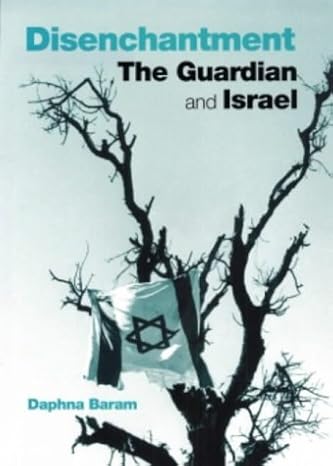
Original price was: €99.00.€36.00Current price is: €36.00.
Disenchantment: The ‘Guardian’ And Israel By Geoffrey Alderman Price comparison
Disenchantment: The ‘Guardian’ And Israel By Geoffrey Alderman Price History
Disenchantment: The ‘Guardian’ And Israel By Geoffrey Alderman Description
Discover “Disenchantment: The ‘Guardian’ And Israel” by Geoffrey Alderman
Unlock a profound exploration of journalism and politics with “Disenchantment: The ‘Guardian’ And Israel” by Geoffrey Alderman. This compelling book takes readers through the intricate relationships between media perceptions and political realities concerning Israel, making it a must-read for those interested in contemporary journalism and political discourse.
Key Features and Benefits
- In-depth Analysis: Alderman provides a thorough examination of how The Guardian newspaper represents Israel. Readers gain insights into media bias and its implications on public perception.
- Critical Perspective: The author offers a unique perspective that challenges preconceived notions, encouraging readers to think critically about media narratives.
- Engaging Writing Style: With a clear, engaging tone, Alderman’s writing captivates readers, making complex themes accessible and relatable.
- Thorough Research: This book is backed by extensive research and well-documented references, offering credibility and authority to the author’s arguments.
- Publisher Information: Published by Politicos Publishing in January 2004, each copy weighs 1.33 pounds, making it a substantial addition to any bookshelf.
Comparative Pricing Across Suppliers
Price comparisons show that “Disenchantment: The ‘Guardian’ And Israel” is available at varying prices. Online retailers offer competitive pricing with discounts, while brick-and-mortar bookstores may charge a premium. Shopping around can save you significantly, ensuring you don’t miss out on this enlightening read.
Price Trends Over the Last 6 Months
Our 6-month price history chart reflects notable trends in pricing fluctuations. Initially priced higher, recent discounts indicate a growing interest in the title, making now an opportune time to purchase. Whether you’re a seasoned reader or new to issues surrounding media and Israel, this book’s price trend suggests it’s an optimal period to add it to your collection.
Customer Reviews Summary
Customer feedback highlights the engaging narrative style and in-depth analysis as standout features of Alderman’s work. Readers appreciate the author’s ability to address complex issues with clarity. Many have praised the book for challenging their understanding of media representation, noting that it sparks significant discussions. However, some reviews mention that the book could benefit from a more balanced perspective on certain topics. Overall, it is a well-received title among both critics and the general public.
Explore Unboxing and Review Videos
For those looking to delve deeper into “Disenchantment: The ‘Guardian’ And Israel,” various unboxing and review videos are available. These visual insights can help potential buyers understand the book’s content and presentation. Such resources enhance the purchasing decision and provide a glimpse into the themes discussed by Alderman.
With its market relevance and insightful commentary, “Disenchantment: The ‘Guardian’ And Israel” is an essential read for anyone invested in media studies, politics, or Israeli affairs. The book not only sheds light on the complexities of media reporting but also encourages readers to question the narratives that shape our understanding of international events.
Don’t miss out on this opportunity to broaden your perspectives. Compare prices now! Dive into the intricate world of media and politics shaped by Geoffrey Alderman’s expertise. Whether you’re browsing for academic references or a personal read, this book is a valuable addition to your collection.
Disenchantment: The ‘Guardian’ And Israel By Geoffrey Alderman Specification
Specification: Disenchantment: The ‘Guardian’ And Israel By Geoffrey Alderman
|
Disenchantment: The ‘Guardian’ And Israel By Geoffrey Alderman Reviews (2)
2 reviews for Disenchantment: The ‘Guardian’ And Israel By Geoffrey Alderman
Only logged in customers who have purchased this product may leave a review.











Jill Malter –
I used to be an avid reader of the Guardian (back then it was the Manchester Guardian). And this newspaper has gone way downhill from the days when it featured excellent reporting and a liberal point of view in its editorials.
I’m not going to bother to argue the issue of whether the Guardian is anti-Semitic or not. Daphna Baram asks that question in this book, and says it is not. Well, what I think does not matter much, but she’s wrong. The Guardian is a clear participant in a gratuitous war against the Jews, and especially against Israel. It is anti-Semitic whether I admit it or not. If I, or anyone else, were to consistently express the same views about Israel that we consistently see in the Guardian, we’d be called anti-Semites, for good reason. If you wish, you can look at plenty of books (as well as the Guardian itself) to see specific substantiation of what I’m saying and decide for yourself whether Baram is right or wrong.
Baram makes one excuse after another for the Guardian. Some of them are interesting. She says that the Guardian did start to change its stance during the Jewish revolt against British rule which eventually drove the British out of the place. And she traces some further steps that the Guardian took, all of which she blames on Israel! We do discover some places where the Guardian went further than it had gone in the past, such as when it published two full chapters of a malicious book by Norman Finkelstein.
Yes, the Guardian has gotten worse, much worse. And Baram’s book can’t make it all better. As a matter of fact, I had a very tough time getting a copy of the book. It took me quite a while to acquire it! Anyway, now I finally have a copy and I’ve finally read it! I think it is interesting to read, but only because of my specific interest in the etiology, nature, and consequences of anti-Zionist untruths.
Baram is quick to blame the Guardian’s problems with its stance on Israel not on the Guardian itself, nor on an unjustifiable obsession with Israel, but on those who have the nerve to complain about it! Yes, that would make people such as me the problem! Does anyone really think that if people such as me merely stop talking about the Middle East, there won’t be any problems there any more?
Baram also complains that the Guardian keeps getting falsely accused. After all, she implies, it doesn’t mess up facts. It’s honest. The problem is that, at worst, it just does not like Israel!
Well, yes, the Guardian doesn’t like Israel. And that dislike goes far enough to make it display incredible bias, come up with misleading articles, and ignore facts it does not like. Does it go so far as to come up with outright misinformation? Of course it does, and some of that misinformation is pretty serious. On the other hand, the, um, “dislike” of Israel appears to me as something more like perpetual demonization of Israel, giving the impression that Israel is a weird nation that does things that have little or nothing to do with logic or motives.
I was puzzled by Baram’s boast that the Guardian did not call the attack on Jenin a massacre. Yes, some of the media were even worse than the Guardian (for a change) on this one topic, but so what?
Some former writers for the Guardian have commented on the Guardian’s problems with Israel, including Melanie Phillips and Julie Burchill. In this book, Baram admits that Jonathan Freedland, who (as far as I know) still writes for the Guardian has mentioned that the Guardian does have a couple of problems, such as appearing to suggest “that the Jewish state is an illegitimate entity,” or maybe even appearing to insinuate “that Israel is somehow responsible for all the world’s problems.” Freedland also pointed out that most Jews see Israel as “a tiny state with 6 million citizens, surrounded by 22 hostile Arab states.” Well, I can see why! Israel is a tiny state, a land-poor one at that, and it is indeed surrounded by a hostile Arab world. That Arab Empire is around 5,500,000 square miles, while Israel, even including all of the West Bank, all of Gaza, all of the Golan, and all of Jerusalem, is only 11,000 square miles, 500 times less.
Baram says that the notion that Israel is a tiny nation surrounded by 22 hostile Arab states is “outdated.” I think that is a very unfortunate choice of words on her part, given the Arab world’s population and resources.
Perhaps it is true that decades ago, the Guardian wanted to save the Jews (later the Israelis) from the Arabs. And that it soon wanted to “save Israel from itself.” And perhaps by now it wants to, um, save the Arabs (or maybe even the world) from Israel. In my opinion, had the Guardian taken a political stance that it could defend, obeyed journalistic standards, and had watched its language, it could have maintained much of its reputation. But it didn’t. The Guardian correspondent, Suzanne Goldenberg, won (according to the director of the Israeli government press office, Danny Seaman) “the complete disdain and contempt of the Israeli authorities.” Baram does not even bother to take Seaman’s comment seriously but simply dismisses it. Once again, she’s wrong to do so.
Well, enough of this book.
Andy Simons –
There are some good books on the Guardian, with two outstanding novels being Malcolm Muggeridge’s “Picture Palace” (1934) and Annalena McAfee’s “The Spoiler” (2011). For those interested in how the Guardian has struggled to navigate between the Zionist project and valid criticism of it, this is the right book. The Guardian was never as Zionist as the New Statesman (see Khalid Kishtainy’s important work, “The New Statesman and the Middle East” (Beirut : Palestine Research Center, 1972). Make no mistake, the newspaper’s history is full of support and the leader writer Harry Sacher and Weizmann protege is spotlighted here ~ he essentially wrote the Balfour Declaration in snappy but intentionally vague language, although that fact isn’t in this book. Also, Michael Adams (“Publish it not…The Middle East Cover-Up,” 1975 & 2006) is analysed here and his editorial problems are deemed to have caused by stylistic reasons, rather than for his reporting of the truth. And Jonathan Freedland is portrayed as a softly reasonable go-between, somehow representing the ‘Jewish community’ to the paper; I don’t happen to view him kindly but it doesn’t detract from the book’s importance. As the author states, ” a majority in the Jewish community wants to be endorsed by the liberal media, and is willing to take a liberal stand on just about everything except Israel.” There’s much historical newsbeat ground to be covered in this 2004 book, but as you trod you’ll learn lots and it’s still relevant today.